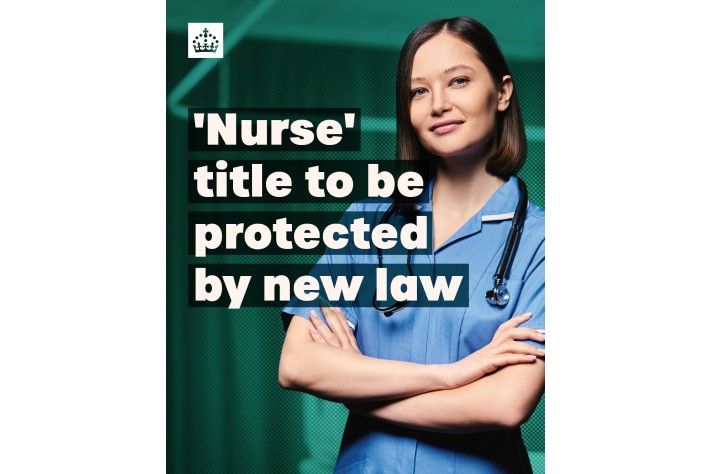On International Nurses Day (#IND2025), new measures to make it a criminal offence for people who are not qualified as a nurse to use the title and mislead the public.

Anyone misleading the public and describing themselves as a nurse without the relevant qualifications and registration will be committing a crime, under new measures announced by the government to protect the title ‘nurse’ in law.
The move will help to boost protections and safety for both patients and staff, driving up standards and improving patient experience across the NHS through the government’s Plan for Change.
Currently, anyone – including those struck off by the Nursing and Midwifery Council (NMC) for serious misconduct or criminal convictions – can call themselves a nurse. This can result in the public thinking they’re getting advice and care from an expert professional like a nurse when they aren’t.
Previous reported examples of the job title being misused include someone calling herself a nurse at a large public event after being struck off and another reportedly masquerading as an aesthetic nurse.
There will be exemptions for relevant professions like veterinary nurse, dental nurse and nursery nurse, where the title ‘nurse’ is legitimately used.
The government is listening to nurses and recognises they are the backbone of the NHS, and today’s announcement follows campaigning by unions for the government to act on the issue, as well as by Dawn Butler MP who introduced a Ten-Minute Rule Bill earlier this year to protect the title ‘nurse’.
Through the Plan for Change, the government is driving forward vital reform to get the NHS back on its feet and fit for the future. This year, a refreshed workforce plan will also be published to ensure the health service has the right workforce in the right place at the right time.
Health and Social Care Secretary Wes Streeting said:
“Nurses carry out lifesaving work every day, and I am determined we do everything we can to support them and safeguard trust in the profession.
“I’ve been appalled to read reports of so-called nurses spreading dangerous misinformation and harming the public.
“This new legislation will help crack down on bogus beauticians and conspiracy theorists masquerading as nurses, and those attempting to mislead patients.
“The British people hold nurses in the highest regard, and we trust them in our most vulnerable moments, so patients need to know they are genuinely being seen by a nurse. Now they will.
“This is part of our Plan for Change to fix the NHS and gets the right staff working in the right place at the right time.”
Only the title “registered nurse” is currently protected in law. The new legislation will change that – ensuring that only those individuals registered with the NMC can legally use the title. Anyone violating this will be committing a criminal offence and could face a hefty fine running into the thousands of pounds.
There have been previous reports of bogus nurses misleadingly using the title. One ran a cosmetic clinic offering Botox and dermal filler treatments for several years despite not being registered with the NMC.
Another gave a speech at a Covid conspiracy rally which likened NHS nurses and doctors to war criminals – spreading misinformation about vaccines and bringing her former colleagues into disrepute. She continued to call herself a nurse despite being struck off by the NMC.
A previous Freedom of Information request showed that across 93% of all NHS trusts, there were more than 8,000 people with the term “nurse” in their job title who had no registered nursing qualifications. Although these people are supervised and providing important care, their job titles can cause confusion. Some, including nursery nurses, will be exempt under this new legislation
Duncan Burton, Chief Nursing Officer for England, said:
“The trust that people place in registered nurses is based on the rigorous training and education required to be registered as a nurse which gives us the skills and knowledge to deliver high quality, safe and personalised care.
“Nurses value this trust and protecting the title of nurse can give added confidence and clarity to patients and the public on who is delivering their care and the skills and knowledge they have.”
There are already various safeguards in place to deter people from pretending to be a nurse. The most serious cases would be captured by fraud offences and, depending on the case, they can also be prosecuted for other more serious offences like causing grievous bodily harm, assault, or manslaughter.
The new legislation – expected to be laid this Parliament – will help to strengthen those existing safeguards.
Registered nurses go through high-quality undergraduate and postgraduate degree programmes and complete a process called revalidation every three years – ensuring they can continually update their skills set. The new measures reflect that.
Alison Morton, CEO, Institute of Health Visiting, said:
“The Institute of Health Visiting fully supports the campaign to protect the title “nurse” in legislation. This is urgently needed to protect the public and provide assurance that the person providing their care has the qualifications, knowledge, skills, expertise and professionalism to deliver safe and effective care. Nursing is a safety-critical workforce. And, in our view, there is only one clear path forward, the current gap in legislation needs to be closed as a matter of urgency.”

